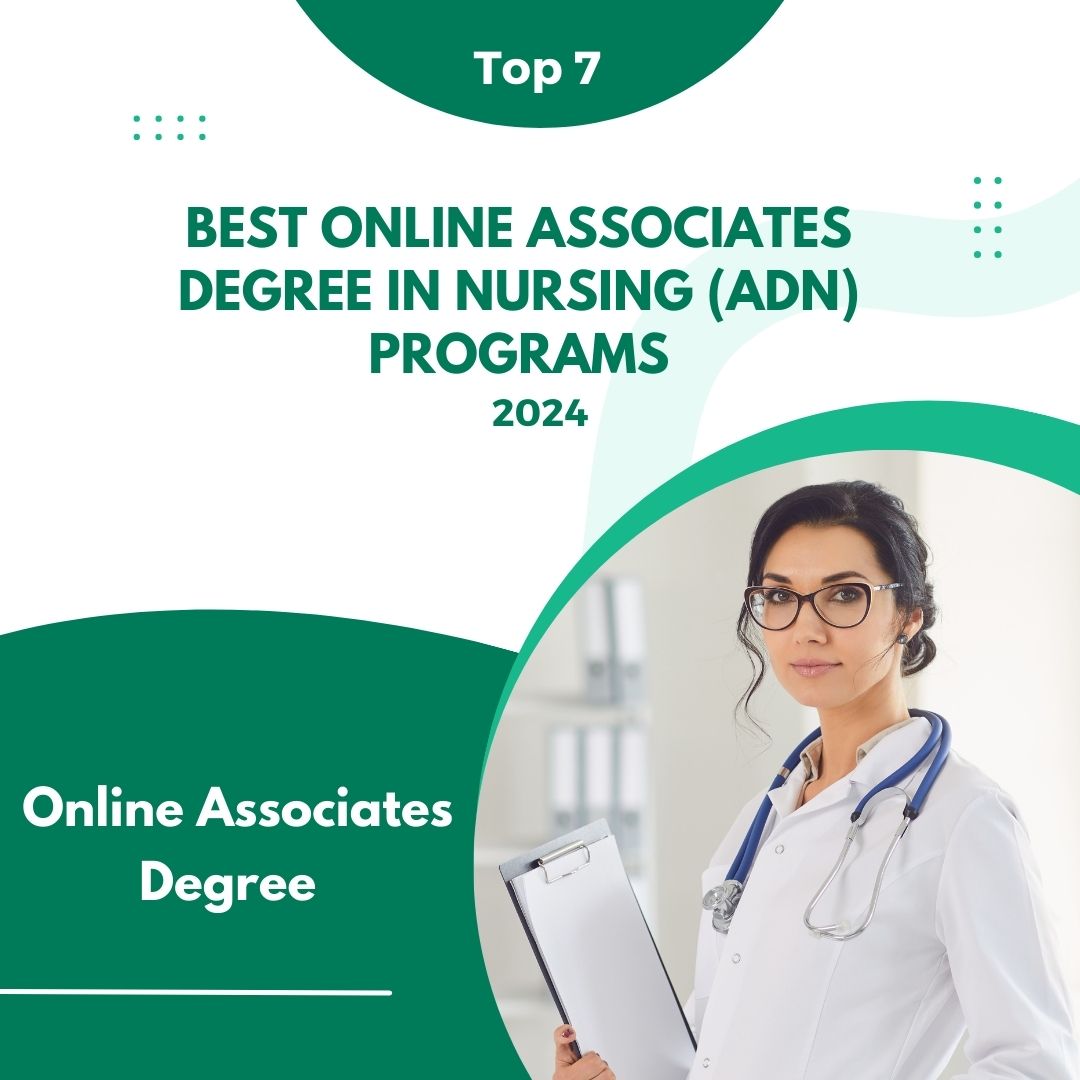Top 7 Best Online Associates Degree in Nursing (ADN) Programs 2024
If you’re interested in pursuing an online associates degree in nursing, we understand that attending college as a full-time, on-campus student may not be possible.
You may already be working as a certified medical assistant or a licensed practical nurse (LPN) and looking to further your education and knowledge on becoming a nurse while continuing to work in a different vocation.
Or you may be a single parent and cannot attend scheduled class times that keep you away from your children and other home responsibilities.
Well, we’ve got some good news for you! An associates degree in nursing online might be the solution you’ve been looking for.
The online ADN programs offer the flexibility to work around your schedule and complete your degree remotely (or at least part of it). So, why not give it a shot and take your first step towards pursuing your dream career?

Online ADN Programs Overview
Associate Degree in Nursing (ADN) programs have seen a significant increase in popularity in recent years, providing hopeful nurses with an accessible and flexible route to their nursing career. They are designed to give the foundation for nursing skills and knowledge, making them an excellent option for those looking for a career as Registered nurses (RNs).
The main benefit of online ADN programs is their flexibility. Students can often complete their coursework on their schedule, making it more manageable for them to juggle obligations at work or other commitments as they pursue their nursing education.
While the curriculum for ADN programs is the same as traditional in-person classes, there are some significant differences, especially in how the clinical training process is carried out. Specific online ADN programs require the students to take clinical instruction in a different location, typically in healthcare facilities close to their residence.
This practical experience is vital to develop the clinical competencies and skills required for nursing. Students taking online ADN courses can access numerous digital learning resources and online platforms to integrate nursing information and improve general learning.
The affordability of online ADN programs is another reason attracting prospective students. These programs typically provide the lowest cost of becoming an RN compared to traditional options on campus. Additionally, financial aid options might be offered to assist students to pay for their education costs.
Online ADN programs can also draw those changing careers, working professionals, or those looking to expand their current roles in healthcare. As the need for highly trained nurses increases, Online ADN programs offer a flexible and easy path to a career in this rewarding field.
Detailed Explanation Of The Top 7 Best Online Associates Degree in Nursing
1. John A. Logan College
John A. Logan College is a community college located in Carterville, Illinois, established in 1967. It has low tuition for online learning and credit that can be transferred easily if you choose to move to a four-year institution and earn your bachelor’s degree. The school has agreements with various institutions that allow for easy transfer. Additionally, John A. Logan College offers job placement assistance to its graduates, ensuring that the transition into becoming a full-time RN will be smooth.
A Hybrid Online ADN Program
John A. Logan College provides the associate of applied science (AAS) degree in nursing via a hybrid program of courses offered on campus and nurses taught online. This 2-year course, after completing your required courses, provides opportunities for career advancement. In addition, John A. Logan College has experience helping students take an NCLEX-RN test and become nurses.
- NCLEX-RN Pass Rate: 93.0%
- Program Length/Credit Hours: 73.5
- Admission Requirements: Prerequisites with a minimum grade of C in all classes, entrance test
- Tuition: $97 for each credit hour (in-district) and $315 for each credit hour (out-of-state students)
- Accreditation: Yes (IDFPR and ICCB)
2. Allegany College of Maryland
Allegany College of Maryland is a top-quality community college that is affordable and offers associate degrees with the mission to serve a wide variety of students, such as veterans, homemakers, and people looking to expand their careers. The College is consistently awarded top scores from students and is listed among the top 20 “Value-Added” Colleges by the Brookings Institution.
Fully Online LPN to RN Bridge Program
The associate’s nursing degree offered by Allegany College of Maryland is specifically geared towards students who have been nurses. Since the LPNs have completed their training hands-on, There aren’t any classes on campus to take. What makes this program particularly profitable for those who don’t reside in the immediate area is the fact that it’s been classified as a Health Manpower Shortage Program, which means that Maryland residents living outside Allegany County who enrol in the program could be eligible for tuition in the county costs. However, students from outside the state still have to pay tuition outside of the state.
- NCLEX-RN Pass Rate: 90.3%
- Program Length/Credit Hours: 70
- The admission requirements are: LPN license, 2 years of experience as an LPN with at least a 2.5 GPA, an entrance test
- Tuition: $114 for each credit hour (in-district) and $357 for credit hours (out-of-state)
- Accreditation: Yes (ACEN)
3. Hutchinson Community College
Like other colleges listed at the top of the list, Hutchinson Community College is a community college offering flexible learning schedules, including online learning, at a very affordable cost. Hutchinson Community College has graduated more than 90,000 pupils and has been widely believed to have one of the top educational programmes in Kansas.
An Online Program with a Personal Touch
Hutchinson Community College offers an LPN to RN Online Bridge. Similar to other bridge-related programs, this permits students to complete all their classes online since you must first complete the hands-on instruction and be licensed as an LPN. The graduates of the Bridge online program are guaranteed a 100 per cent job placement rate.
What makes Hutchinson Community College’s program different is that although the classes are offered online, there is personal access to counsellors. When it’s time to complete your clinical at the conclusion of your course, Your counsellor will assist in organizing your clinics at a medical centre near your home.
- NCLEX-RN Pass Rate: 83.1%
- Program Length/Credit Hours: 70
- Admission Requirements: LPN license, minimum C average, entrance exam
- Tuition: $99 for each credit hour (in-state) and $150 for each credit hour (out-of-state)
- Accreditation: Yes (ACEN)
4. Western Iowa Tech
Western Iowa Tech is a publicly funded comprehensive community college that provides an array of educational and vocational programs, including distance learning and online courses. The college was established in 1966 and has had a long history of providing students from all over the world access to higher education. Western Iowa has had available online classes since 2002, so it isn’t an entirely new idea for the institution.
A Flexible Hybrid Online Education with an LPN Bridge Option
At Western Iowa Tech, you will obtain the Associate of Applied Science (AAS) degree in nursing by completing a blended program with either a part-time or full-time schedule. It’s a 1-plus-one program, the first portion designed to allow students to study on campus at Sioux City, Iowa, and eventually become an LPN. The program’s second component is primarily online, and you will earn an AAS degree and qualify to sit for the NCLEX-RN exam to become a registered nurse.
If you’re already an LPN and are an LPN, you can transfer to the online program to earn your AAS certificate as a distance learning student.
- NCLEX-RN Pass Rate: 81.6%
- Program Length/Credit Hours: 73
- Admission Requirements: High School diploma, prerequisites
- For tuition in-state: $139 for each credit hour (in-state or on campus), $ 140 per per credit hour (out-of-state or on campus), $162 per hour (online classes)
- Accreditation: Yes (IBN, NCSBN)
5. Excelsior College
Excelsior College is a private, non-profit educational institution offering various courses for adults. The college aims to satisfy the needs of students both academically and geographically, and all of its programs are geared towards careers.
Earn Your Associate Degree at Your Own Pace
School of Nursing at Excelsior College has been designated as an 2011-2016 NLN Centre of Excellence for Nursing Education from the National League for Nursing. The school offers a variety of nursing degrees, including an online associate of science and an associate with applied science degrees. The associate’s nursing degree can be considered an LPN to ADN bridge program, which means you must have the qualifications of an LPN and undergo experience in the field before registering.
The ADN course offered at Excelsior College is appealing because it can be completed at a pace that suits you. It is possible to take classes at any time you’d like and go in your way. Furthermore, Excelsior College offers a vast collection of online learning tools, such as study guides and exam preparation tools.
- NCLEX-RN Pass Rate: 77.2%
- Program Length/Credit Hours: 67
- Entry Requirements for Admission: LPN license
- The tuition rate is $390/credit hour
- Accreditation: Yes (ACEN)
6. Pratt Community College
Pratt Community College is a community college with two years of study in Pratt, Kansas, emphasizing “maximum student learning, individual and workforce development, and high-quality instruction and service.” The College was an Aspen Prize top 150 winner of the Aspen Prize for Community College Excellence 2015.
A Full-time Hybrid Online Program
The ADN program at Pratt Community College is an intensive hybrid online course requiring an LPN license. Most theoretical classes are taught online, and the clinical studies will be conducted at the Pratt Community College campus. The ADN course is an all-time course, and the school suggests students consider it a full-time employment opportunity.
- NCLEX-RN Pass Rate: 60.7%
- Program Length/Credit Hours: 71
- Entry Requirements for Admission: LPN license, prerequisites with a minimum grade of C in all classes.
- Tuition: $147 per credit hour plus $60 per class nursing fee
- Accreditation: Yes (ACEN)
7. Northwestern Michigan College
Northwestern Michigan College is a public community college with an enrollment of more than 50,000. Due to its online learning program, students are enrolled in the Grand Traverse region of Michigan and beyond. Northwestern Michigan College offers Bachelor’s and Associate’s degrees, unlike most community colleges.
No Nursing Experience Needed
Northwestern Michigan College offers a Nursing Online option, which is a blended program. Attending clinical and lab courses in person on campus at Northwestern Michigan College is required. Still, all other classes are available online, and you do not need an LPN license before starting. This program is geared towards full-time students. It is recognized through ACEN and has agreements for articulation with several universities of four years if you choose to pursue your bachelor’s degree in nursing.
- NCLEX-RN Pass Rate: Not Available
- Program Length/Credit Hours: 70
- Entry Requirements for Admission: Minimum requirements that include at least a 2.5 GPA
- Tuition: $96 per unit (in-district), $249 per unit (out-of-state)
- Accreditation: Yes (ACEN)

Admission Requirements for Online ADN Programs
Requirements for admission to online Associate Degree in Nursing (ADN) courses are crucial to ensure applicants possess the fundamental understanding and competencies required to succeed. Here are some essential points about the prerequisites:
High School Diploma or equivalent:
Most online ADN applications require applicants to possess a High School diploma or GED equivalent as an essential educational requirement.
Required Courses:
Certain programs require the completion of prerequisite courses in subjects such as biology, chemistry, anatomy and physiology to ensure that students have a solid scientific foundation.
Minimum GPA:
Applicants may be required to meet the minimum GPA of 2.5 or 3.0 on the 4.0 scale.
TEAS and HESI Exam scores:
Nursing programs often require applicants to pass standardized exams, such as the Test of Essential Academic Skills (TEAS) or the Health Education Systems, Inc. (HESI) test.
Criminal Background Check:
Numerous nursing courses, such as online ADN programs, will have applicants undergo a criminal background check and drug screening.
Immunizing Records:
Proof of up-to-date immunizations and vaccines is usually required for clinical placements.
Letters of Recommendation:
Certain programs require letters of recommendation from employers or teachers to evaluate an applicant’s character and ability to be a good candidate for nursing education.
Fulfilling these admission requirements by completing one of the internet-based ADN programs is the first step to being a certified nurse.

Program Duration in Online ADN Programs
The length of the online Associate Degree in Nursing (ADN) program plays a crucial aspect in the preparation and commitment required of prospective students. Understanding the timeline of the program is vital for efficient time management. Here are some essential points regarding program duration for online ADN programs:
- Standard Program Length: An online full-time ADN program typically lasts for 2 academic seasons or terms, equal to 60 and 72 credit hours.
- Part-Time Options: Some programs offer part-time studies, which allow students to finish the course in a longer time, which is usually flexible for working professionals or students with other commitments.
- Accelerated Tracks: A few web-based ADN programs offer accelerated tracks for students who want to finish their studies quickly. These programs can be completed in as short as 18-24 months.
- Variable Program Lengths: Program lengths may vary depending on various aspects, including the institution’s schedule and the speed of the student’s completion of their coursework.
- Clinical hours: Most of the program’s duration is devoted to completing clinical hours, allowing students to gain practical experience in a healthcare setting. The hours of clinical experience can vary in different programs but are usually required to graduate.
- Bridge programs: for those with previous nursing qualifications, like licensed Practical Nurses (LPNs) or licensed Vocational Nurses (LVNs). There are usually ADN bridge programs that are shorter in duration. This is because credit is awarded for previous educational and work experiences.
Understanding the length of the program helps students plan their education journey with ease, considering aspects like family, work, and personal obligations. The flexibility offered by specific online ADN programs regarding part-time or accelerated programs allows students to select an appropriate schedule suited to their particular circumstances.

Cost and Financial Aid for ADN Online Programs
The tuition and fees for ADN programs generally vary from $8,000 to $36,000. This amount is estimated to cover the two-year degree’s duration. The financial aspect of earning the Associate Degree in Nursing (ADN) online is important for many potential students. Although online programs may provide unique benefits, knowing the structure of costs and financial aid options can assist in making informed choices. Here are some essential information regarding the fees and financial aid in ADN online programs:
- Tuition Fees: The tuition for online ADN programs can be wildly different dependingdepending on the school or location and the program’s reputation. Based on these variables, the cost can range from several thousand dollars per semester up to more significant amounts.
- Additional Expenses: Apart from tuition, students need to be aware of other expenses like:
- Books and other materials
- Equipment for clinical use (e.g. the stethoscope and uniforms)
- Exam and licensing costs
- Access to technology or online charges
- Financial Aid Availability: Many institutions offer financial aid to eligible students. These packages can dramatically cut out-of-pocket costs. The sources of support include:
- Federal loans and grants
- Scholarships and grants that are specific to states
- Private scholarships
- Scholarships or institutional grants
- Work Study Programs: Certain schools might offer work-study options, allowing students to earn a living while gaining relevant experience in their study area.
- Pay Plans: To ease financial strain; several institutions offer instalment payment plans that allow students to spread their tuition costs over several months.
- Veterans and Military Benefits: Veterans and military personnel could be eligible for benefits from their education that can be redeemed towards ADN program expenses.
Many people choose to enroll in the ADN program online. It isn’t solely about flexibility and convenience but also about cost. Through research on tuition, related expenses, and possible financial aid options, prospective students can locate the right program to meet their financial and academic requirements. Researching all options and talking to the financial aid office at the school you’ve chosen for personal advice is essential.
How Much Can You Earn With an ADN?
A degree in nursing with an Associate’s Degree (ADN) could provide a path to a profession as a Registered Nurse (RN). The pay one can expect to make through an ADN will vary based on several aspects, including area, experience, the area of specialization, the nature of the facility (hospital clinic, hospital nursing home, clinic, etc. ) and many more.
In my most recent update, in 2023, the average salary of nurses within the United States was around $70,000 to $90,000. But those just beginning their careers with an ADN may earn less than the upper end of the range, while those with experience or in more specialized positions could earn higher wages.
Nurses working on the outskirts or in states with higher living costs could be paid more than nurses living in rural areas or those with lower living costs. It’s important to note that higher education, like a Bachelor of Science in Nursing (BSN) or a Master’s degree, could increase the chances of earning more specialized positions in the field of nursing.

Licensure and Certification in Online ADN Programs
Obtaining licensure and certification is one of the most important outcomes for students who have completed the online Associate Degree in Nursing (ADN) programs since they permit individuals to work as licensed nurses (RNs) legally. Here are the key details regarding the licensing and certification process in the online ADN programs:
- NCLEX-RN Exam: Graduates of ADN programs, traditional or online, must be able to pass an exam called the National Council Licensure Examination for Registered Nurses (NCLEX-RN). This exam tests the skills and knowledge necessary for safe and effective nursing practice.
- State Requirements: The right to practice as an RN is granted by state nursing boards. This means that the specific requirements for licensure could differ between states. Students who enrol in online ADN courses should be aware of the state’s requirements for licensure.
- Clinical hours: Training in clinical areas is an integral part of ADN courses, and the number of hours needed for clinical training may differ by state. Students must finish these hours to satisfy the state’s licensing requirements.
- Certifications and Specializations: Although the ADN program helps students prepare to become RNs, some might pursue other specializations or certifications, like being certified as a pediatric nurse or a critical care nurse. These certifications typically require further training and certifications in addition to the ADN program.
- Continuous education: Maintaining licensure often involves meeting the requirements for continuing education, which aids nurses in staying abreast of the latest developments in nursing and healthcare.
- Reciprocity and endorsement: If a person with an ADN license wants to practice within a different state, they can seek exchange and approval, which permits their license transfer. The requirements for this process could differ by state.
Obtaining licensure and certification is an essential step for students who have completed online ADN programs to begin their nursing career. Students must ensure they satisfy the state’s standards and take the NCLEX-RN test to be licensed registered nurses. Continued education and pursuit of special qualifications can help improve career prospects and enhance professional development in the nursing field.
Online Learning Platforms for ADN Programs
Online learning platforms play a crucial role in helping to facilitate education in the digital world, particularly for flexible or remote learning environments. These platforms are essential to ensure the proper execution of the online Associate Degree in Nursing (ADN) courses. These platforms’ key features include:
- Interactive User Interface: Most online learning platforms come with an intuitive interface that allows students to effortlessly navigate courses to access their materials and connect with their instructors and fellow students.
- Multimedia Content: They support different content formats, such as audio lectures, video slides, and interactive simulations that accommodate various ways of learning.
- Discussion forums: One of the most prominent features of online platforms for learning is the accessibility of discussion forums where students can submit questions, share their resources, and participate in discussions with others.
- Assessment tools: Quizzes, assignments, and exams are managed and monitored through these platforms, allowing instructors and students to track their students’ progress.
- Mobility Accessibility: Numerous platforms offer mobile apps, which allow students to access their course material and engage in discussions while on the go.
- Integration with Digital Libraries: Some platforms work into digital library systems, providing students with abundant reading and research sources.
- Interactive Tools for Real-Time Collaboration: Features like video conferences, shared whiteboards, and document co-editing allow real-time collaboration between students and instructors.
Using the potential of online education platforms, ADN programs can provide students with a rich and interactive learning experience that ensures they are prepared for their nursing careers.
FAQs About ADN Programs
What is the difference between an RN and an ADN?
A Registered Nurse is a professional licensed by the state with a valid NCLEX RN exam and licensed to work in the nursing field. However, the ADN or Associate’s degree in Nursing is a two-year education program that teaches the fundamentals of nursing knowledge. However, all ADN graduates can become RNs after passing their licensure examination; not all RNs require an ADN since there are different educational paths for nursing.
Can I pursue an ADN program online?
Although numerous schools offer online classes in their ADN courses, the clinical component will typically require in-person attendance. Specific programs might provide hybrid programs that include online courses in theory and in-person clinical training.
Is an ADN the same as an LPN?
There is no such thing as An ADN, and LPN is different. An ADN or Associate’s degree in Nursing is a two-year education program that prepares participants to qualify as registered nurses (RNs) when they pass the NCLEX-RN examination. On the other hand, LPNs, also known as LPNs or Licensed Practical nurses, receive a shortened training course and, after passing the NCLEX-PN test, are employed with the guidance of RNs or doctors. Both roles are vital for patient healthcare; RNs can perform more practice than LPNs.
How long does it take to complete an ADN program?
Most ADN programs require about two years for completion if they are pursued full-time. However, some part-time programs could take longer to complete, and some advanced programs may allow students to complete the program in less time.
Can I work as an RN with just an ADN?
Yes, each ADN and BSN graduate takes the NCLEX-RN test to become a registered nurse. However, employers might want or need nurses to hold a BSN.